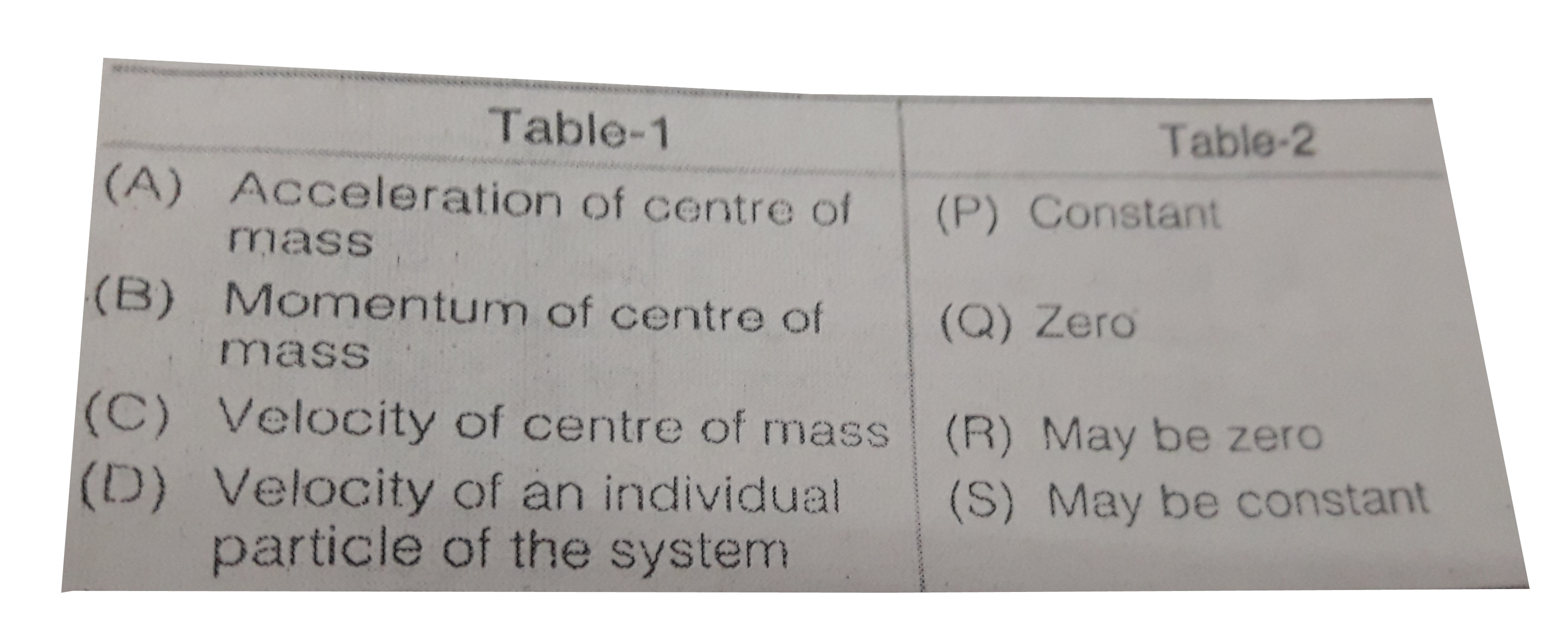Assertion: If net force on a system is zero, then momentum of every individual body remains constant.
Reason: If momentum of a system is constant, then kinetic energy of the system may change.
If both Assertion and Reason are correct and Reason is the correct explanation of Assertion.
If both Assertion and Reason are correct but Reason is not the correct explanation of Assertion.
If Assertion is true but Reason is false.
If Assertion is false but Reason is true.
The correct Answer is:D
To solve the question regarding the assertion and reason provided, we will analyze both statements step by step.
Step 1: Analyze the Assertion
The assertion states: "If net force on a system is zero, then momentum of every individual body remains constant."
- According to Newton's first law, if the net external force acting on a system is zero, the momentum of the entire system remains constant. However, this does not imply that the momentum of each individual body within the system remains constant. Individual bodies can still have momentum that changes as long as their changes balance out to keep the total momentum of the system constant.
Conclusion for Assertion: The assertion is false. The net force being zero means the total momentum of the system is constant, but individual momenta can change.
Step 2: Analyze the Reason
The reason states: "If momentum of a system is constant, then kinetic energy of the system may change."
- The momentum of a system can be constant while the kinetic energy changes. This can occur in inelastic collisions, where momentum is conserved but kinetic energy is not. For example, two objects may collide and stick together, conserving momentum but losing some kinetic energy to sound, heat, or deformation.
Conclusion for Reason: The reason is true. Kinetic energy can change even when momentum is conserved.
Final Conclusion
- The assertion is false, and the reason is true. Therefore, the correct answer is that the assertion is false, but the reason is true.
The assertion states: "If net force on a system is zero, then momentum of every individual body remains constant."
The reason states: "If momentum of a system is constant, then kinetic energy of the system may change."
- The assertion is false, and the reason is true. Therefore, the correct answer is that the assertion is false, but the reason is true.
Topper's Solved these Questions
- BOOK - DC PANDEY ENGLISHCHAPTER - CENTRE OF MASSEXERCISE - Match the coloumns9videos
CENTRE OF MASS
- BOOK - DC PANDEY ENGLISHCHAPTER - CENTRE OF MASSEXERCISE - Medical entrances gallery27videos
CENTRE OF MASS
- BOOK - DC PANDEY ENGLISHCHAPTER - CENTRE OF MASSEXERCISE - Taking it together73videos
CENTRE OF MASS
- BOOK - DC PANDEY ENGLISHCHAPTER - CALORIMETRY AND HEAT TRANSFEREXERCISE - Medical entrance s gallery38videos
CALORIMETRY AND HEAT TRANSFER
- BOOK - DC PANDEY ENGLISHCHAPTER - CENTRE OF MASS, IMPULSE AND MOMENTUMEXERCISE - Comprehension type questions15videos
CENTRE OF MASS, IMPULSE AND MOMENTUM
Similar Questions
In net force on a system is zero then
View SolutionIf net external force acting on the system is zero then
View SolutionIf net force on a system of particles is zero, then match the following.
 View Solution
View SolutionIf angular momentum of a system is constant, which of the following will be zero
View SolutionAssertion: If linear momentum of a particle is constant, then its angular momentum about any point will also remain constant.
Reason: Linear momentum remains constant if Fnet=0 and angular momentum remains constant if τnet=0View SolutionIf temperature of the system remains constant during the course of change, the change is
View SolutionA : If net force acting-on a system is zero, then work done on the system may be nonzero.
R : Internal forces acting on a system can increase its kinetic energy.View SolutionAssertion The angular momentum of system always remain constant.
Reason For a system, τext=dLdt=0View SolutionAccording to the principle of conservation of linear momentum, if the external force acting on the system is zero, the linear momentum of the system will remain conserved. It means if the centre of mass of a system is initially at rest, it will remain, at rest in the absence of external force, that is, the displacement of centre of mass will be zero.
Two blocks of masses 'm'and '2m' are placed as shown in Fig. There is no friction anywhere. A spring of force constant k is attached to the bigger block. Mass 'm' is kept in touch with the spring but not attached to it. 'A' and 'B' are two supports attached to '2m'. Now m is moved towards left so that spring is compressed by distance 'x' and then the system is released from rest.

Find the relative velocity of the blocks after 'm' leaves contact with the spring.View SolutionAssertion: Internal forces cannot change linear momentum.
Reason: Internal forces can change the kinetic energy of a system.View Solution

